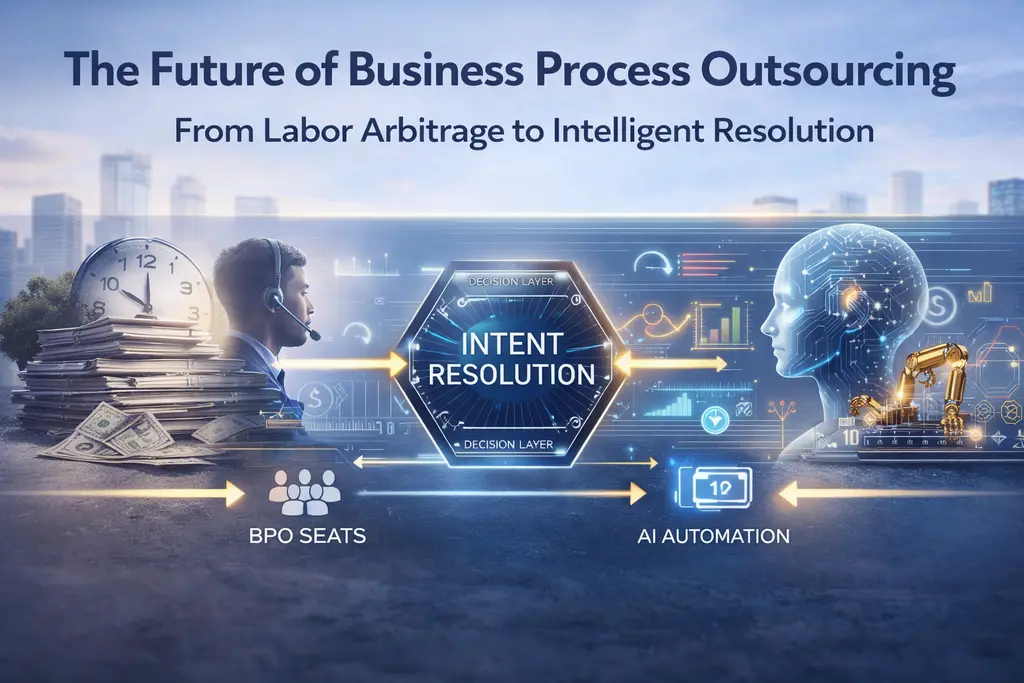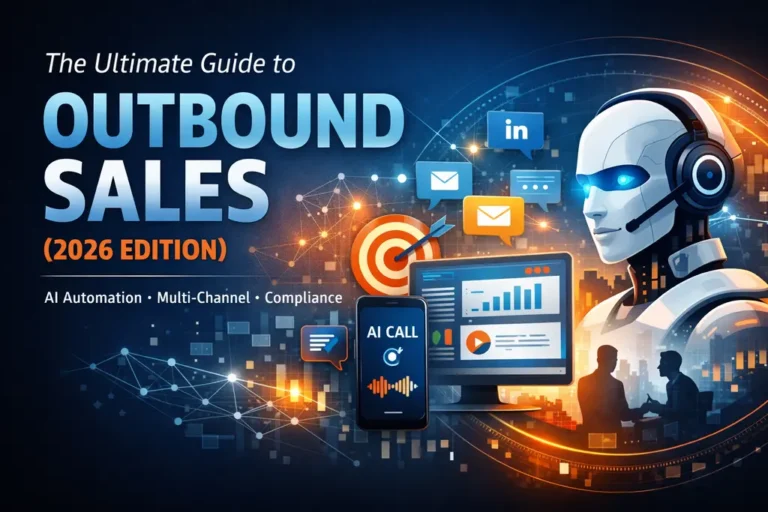The Business Process Outsourcing (BPO) industry has hit a ceiling that human headcount can no longer pierce. For decades, the sector operated on the simplistic premise of labor arbitrage—moving transactional work to regions with lower wage requirements to capture a margin on human time.
In 2026, this model faces a harsh economic reality: a demand for speed that cannot be met by a workforce operating at human speed. Enterprises are moving away from evaluating BPO partners based on “seat count” and are instead demanding Intelligent Resolution. This strategy represents a fundamental transition from buying “hours of labor” to investing in “infrastructure for outcomes.”
The Structural Failure of the Labor-Arbitrage Model
Labor arbitrage was always a temporary discount on friction, not a solution for efficiency. As wages rise in traditional outsourcing hubs and global connectivity levels the playing field, the cost advantage of offshoring is evaporating. More importantly, the complexity of modern business—driven by instant consumer expectations and aggressive regulatory environments—has made “human-only” operations a liability.
In 2026, the friction that was once ignored because it was cheap has re-emerged as a primary cause of Resolution Decay. When a customer’s intent is met with a three-minute hold time or a scripted, non-responsive answer, the value of that interaction doesn’t just stagnate; it actively rots.
The Hidden Tax of Human Latency in Operations
Every human-centric operation carries an invisible “Latency Tax” that traditional BPO metrics like Average Handle Time (AHT) fail to capture. This tax is composed of the micro-delays inherent in human biology and office culture: the seconds lost in call wrap-ups, the context lost during shift handoffs, and the inevitable cognitive fatigue that leads to data entry errors.
Collectively, these delays create a massive gap between the moment a lead expresses interest and the moment that interest is resolved. This gap results in revenue losses for high-velocity sectors like insurance, healthcare, and real estate.
Scaling a legacy BPO to combat this latency usually involves adding more layers of management and training, which ironically introduces more latency and inconsistency.
Scaling Infrastructure Instead of Headcount
The most successful organizations in 2026 treat their voice and data workflows as software infrastructure rather than labor pools. Unlike a human team, an infrastructure-driven system scales instantly and linearly. It does not require a three-month hiring cycle to handle a 500% surge in volume; it simply expands its processing capacity in milliseconds. This shift allows businesses to move away from the “headcount fallacy” and toward a model of infinite throughput.
The question for the modern COO is no longer, “Do we have enough agents for the Monday morning rush?” But, “Is our resolution layer robust enough to handle every intent on the first ring?”
Reassessing the Value of the “Human Touch”
The traditional defense of the BPO model is the necessity of the “human touch,” but in high-volume, transactional environments, that touch is often a myth. When a human agent is forced to handle 80 calls a day under strict occupancy quotas, the interaction becomes a scripted, robotic exchange that lacks true empathy or clinical accuracy.
In these scenarios, the customer is not looking for a “friend”; they are looking for a resolution. Natural Language Understanding (NLU) has reached a point of fluency where it can manage routine interactions with more patience and consistency than a human agent during the tenth hour of a graveyard shift.
By offloading these transactional burdens to intelligent infrastructure, human expertise is finally liberated to focus on the 5% of cases that genuinely require complex negotiation or high-level emotional intelligence.
Compliance as a System Control, Not a Training Outcome
Relying on human agents to maintain TCPA or HIPAA compliance in the 2026 regulatory landscape carries significant risks. Manual compliance depends on consistent human execution under pressure—a variable that is notoriously difficult to control.
In areas like consent management and opt-out handling, a single distracted agent forgetting to verify a suppression list can result in seven-figure class-action litigation. Infrastructure-based systems eliminate this variability by embedding compliance logic directly into the code.
Permission is verified programmatically before a call is ever initiated, and suppression rules are enforced in real-time across every channel simultaneously. In this model, compliance is a guaranteed system state rather than a hopeful training outcome.
The Death of Siloed BPO Functions
Traditional BPO services are often a patchwork of disconnected silos: one team for voice, another for CRM entry, and another for billing follow-ups. This fragmentation is the primary source of the “Repeated Information” frustration that defines poor customer experience. Siloed functions force the customer to restart their story at every touchpoint.
Intelligent resolution replaces these silos with a Unified Decision Layer. Intent is identified once, relevant data is queried across multiple systems automatically, and the action is executed across platforms in a single, seamless interaction. This shift from “outsourcing tasks” to “resolving processes” is the hallmark of the next generation of operational excellence.
The Operational Economics of Intelligent Resolution
The financial transition from labor-based outsourcing to infrastructure-based resolution is a move from variable, headcount-linked costs to predictable, outcome-linked costs.
Labor-based models tie every dollar of expense to human time, which is inherently limited and increasingly expensive. Infrastructure models decouple cost from human availability, allowing businesses to automate the 80% of repeatable work that currently consumes their budget. Investing in growth and innovation can lead to a dramatic expansion of margin, which is the strategic outcome.
In 2026, the competitive advantage belongs to the firm that can resolve a customer’s problem for cents, while their competitor is still paying dollars for a human to take a message.
The Evolution of the BPO Workforce
Automation in the BPO sector does not mean the end of human value; it means the end of the “human as a machine.” Transactional roles—those defined by scripted calls and manual data entry—are being phased out in favor of specialized roles.
The BPO workforce of the future consists of workflow designers, NLU quality analysts, and industry-specific experts who oversee the infrastructure. This transition mirrors the shift from manual manufacturing to automated production lines; the workforce becomes smaller in number but significantly higher in skill and strategic value.
Humans are no longer the “throughput units”; they are the architects of the resolution systems.
Frequently Asked Questions
Why is Natural Language Understanding (NLU) better than traditional IVR?
Traditional IVR (Interactive Voice Response) is a rigid “decision tree” that forces users to navigate menus they don’t want to hear. If a user deviates from the script, the IVR fails. NLU, however, is intent-driven. It understands the context of a conversation, allowing a patient or customer to speak naturally. This reduces “Caller Rage” and ensures that the system can resolve complex needs—like rescheduling an appointment and updating an insurance card—in a single, fluid interaction.
How do we protect data security during an infrastructure transition?
Security in an automated infrastructure is superior to human-centric models because it eliminates the “human factor” of data breaches. Human agents are prone to social engineering, accidental data exposure, or intentional exfiltration. An intelligent infrastructure is a closed loop where data is encrypted at rest and in transit (AES-256). Because the system uses programmatic access, there are no human eyes on the data unless an exception is flagged for review, drastically reducing the attack surface for your organization.
What is the difference between a “Chatbot” and “Agentic AI”?
A chatbot is a reactive tool that can only answer what it has been explicitly programmed to say. Agentic AI is goal-oriented. If you give an Agentic AI a goal—such as “Qualify this lead and schedule an estimate”—it has the agency to select the necessary tools, query the CRM, and adapt its conversation path based on the user’s responses to reach that goal. It acts as an autonomous worker rather than a static script.
How does this model handle “Multi-Channel” suppression and opt-outs?
A major liability in traditional BPOs is “fragmented” opt-outs. A customer might tell a voice agent to stop calling, but that agent fails to update the SMS system. Intelligent resolution uses a Universal Suppression Shield. When an opt-out intent is detected on any channel—voice, text, or email—it is instantly synchronized across the entire infrastructure. This ensures that “No” means “No” everywhere, effectively neutralizing TCPA litigation risks.
Can we maintain “Health Equity” and multilingual support without offshoring?
Historically, offshoring was the only way to affordably support multiple languages. In 2026, NLU models provide native-level fluency in over 30 languages without the latency or cost of an offshore team. This allows you to centralize your operations while still providing high-quality, culturally nuanced interactions to diverse populations, ensuring that language is never a barrier to access or resolution.








